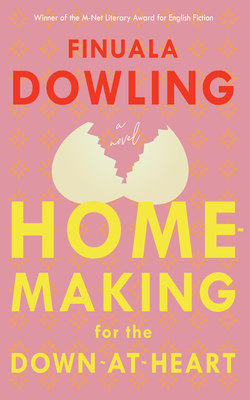Читать книгу Homemaking for the Down-At-Heart - Finuala Dowling - Страница 10
На сайте Литреса книга снята с продажи.
ОглавлениеMr Morland sat cross-legged on his bed, leaning against the wall behind him, facing the shelf with the statue of the laughing Buddha. He did not see his dirty tracksuit pants lying on the floor where he’d stepped out of them. He did not see his many Lotto calculations lying on torn-up scraps of paper. He did not see the incense ash that lay in little piles on his shelves like holy droppings. He allowed his eyes to droop until all he could see was a flickering imprint on the inside of his eyelids. He breathed in and out. He wasn’t aware of it normally, but when he really thought about his breath, he noticed half stoppages and sighs and little poolings of spit that had to be swallowed. He became aware of himself as a pump station. He worried: I must breathe or I’ll die! Come on body, breathe! But that was ridiculous because one’s body didn’t need any encouragement to breathe; it just breathed.
He asked this thought to leave. It trailed off like a child dragging a beach towel through sand. If nothing else killed him, he’d carry on breathing until eventually the Pac-Man of dementia came gobbling right down as far as the brain stem and made him forget how. He supposed that would happen to Zoe eventually. Please leave, asked Mr Morland, and Pac-Man left.
Now he was in a vestibule with his own lungs and windpipe for company. He became his own breath. It was small and dark in this place which locked out the material world. Then the hoardings fell away and there was nothing but space and light. He was so deeply himself that he was no longer Percy at all. The paradox made him laugh. You need to have at least one paradox a day, the masters told him. Then his laughter made him laugh. Here he was, Percy, laughing by himself. Percy! His name made him laugh.
Don’t worry if your child is not like other people’s children. Embrace eccentricity! When Esther, who is sitting beside me as I write this book, realised that Percy was psychic, she took him to séances and found him library books about Edgar Cayce and Nostradamus. Nothing cheered up our blustery Sunday afternoons so much as being calmly told that long-dead Uncle Charley was helping himself to the cooking sherry.
Time for some proper breakfast.
In the kitchen Mr Morland made himself a pan of scrambled eggs. It was the only thing he knew how to cook. He liked to take two eggs, fork them up briefly with a dash of milk, and then pour the yellow liquid into a small, deepish, well-buttered pan. He half scrambled and half folded the mixture, making a kind of scramblette. The problem with stirring or lifting was that the eggs got too light and fluffy. The purpose of food was to act as an anchor, preventing the flesh from dematerialising. He seasoned the thick, greasy scramblette and then left it to come down to a pleasant scoffing temperature while he made the toast.
When he had assembled his breakfast, he sat sideways on the sofa in the front room with its sea view, his plate on his lap so that he could read the paper at the same time as he ate. His long fingers held the toast delicately, as if his connection to planet earth and its breakfasts were tenuous. Occasionally he looked out to the bay or the road below, marking his place on the newsprint with a buttery thumb while his attention drifted. Afterwards he took his plate to the kitchen. Curtis had filled one sink with hot foamy water and one with cold rinsing water. Mr Morland was confused by the science of this arrangement, so he slid his eggy plate and knife into the clean rinsing water.
On his way out, his moonbag securely belted around his waist, Mr Morland passed Curtis in the garden with Pia. Pia was sweeping the shed while Curtis sorted through Margot’s old garden implements and DIY debris. A rusty pair of clippers seemed to hold Curtis’s attention.
“Going to do some gardening?” asked Mr Morland.
“I might. Do you have lots of clients today?”
“Lots,” said Mr Morland. “There’s great curiosity about the spirit world.”
“I suppose everybody wants to know what will happen next in their lives.”
“They usually have a specific problem,” said Mr Morland. “You know, health issues or money worries.”
“Which they could sort out themselves instead of plaguing their ancestors. Why don’t people just eat less and work harder? I hope no one troubles me when I’m dead. Surely these ghosts don’t appreciate being called out? Surely only the mischievous ones make themselves available?”
“And on a Sunday, too,” added Pia, who had stopped playing to listen when she’d heard the word “ghosts”. “Don’t the dead like to sleep late on a Sunday?”
“Oh, the spirits are willing enough, it’s just the flesh that’s weak.” Mr Morland went off chortling at his own joke. He did not mind sceptics and mockers. Everything would be revealed in the end.
